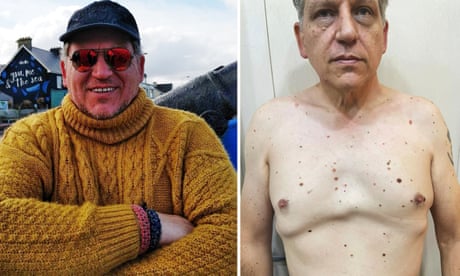- by foxnews
- 23 May 2025
In emotional letter from Iraqi jail, Australian Robert Pether warns his prognosis is ‘bleak’
In emotional letter from Iraqi jail, Australian Robert Pether warns his prognosis is ‘bleak’
- by theguardian
- 08 Nov 2022
- in news

Australian Robert Pether, jailed in Baghdad last year over a business dispute, has penned an emotional letter warning his prognosis is "bleak", his human rights are being violated, and he is facing a potential "death sentence".
In the letter to his family, released to Guardian Australia, Pether also reveals his daily torment about how he should break it to his children that he might not be coming home.
"How do you tell a little girl who loves unicorns and cats that her daddy will not be coming home? How do you tell your children that you are proud of them, but will not be sharing the accolades (and pitfalls) of their lives with them?," Pether wrote.
"And toughest of all, how do you tell your wife, who is very much the other half of you, that you will not be keeping the promise you made to grow old together?
"These are the questions that I am currently grappling with every day - from the moment I wake up and the sit on the cell floor for the first head count of the day, until the last thing at night, when I look at the photos of my family on the wall next to my bed."
Pether was arbitrarily detained in Iraq in April last year over a business dispute between his architecture firm and the Iraqi government. Pether was working on a new headquarters for Iraq's central bank, and had returned to Iraq to resolve a contract dispute at the request of the Iraqi government.
When he turned up to meet bank officials, he was arrested and imprisoned alongside his colleague Khalid Radwan, an Egyptian national.
In a report in March, the United Nations working group on arbitrary detention released a report on Pether's detention, finding it to be arbitrary and a breach of international law.
It also heard allegations that Pether and Radwan's trials were compromised and called for their immediate and unconditional release.
In the letter, written several months ago but only recently released, Pether spoke of his deep fears about the return of his skin cancer in detention.
Pether survived skin cancer in 2005 and was due for a regular screening at the time of his arrest.
While in jail, Pether noticed a new lesion forming on the same ear where he had previously had a melanoma in 2005. He said the Iraqi authorities lacked the skill and experience to treat or identify it.
The dermatologist brought in to examine Pether told him it was nothing and prescribed a tablet and a topical cream, neither of which he received.
He said he began to notice "aggressive changes" in the lesion in June and notified the embassy.
"The clock is ticking and I have a narrow window of opportunity - certainly less time than I am due to be imprisoned for," he said.
"Hope is not forsaken, miracles can (and do) occur. However, the reality at the moment is looking bleak for myself and my family."
Pether said he was not seeking "pity or sympathy".
"What is needed is support," he wrote. "For people to take a stand and say that this type of situation is not OK. That arbitrary detention is not acceptable. That healthcare should be available to meet the needs (as set out in the Nelson Mandela Act). And that a treatable condition should not become a death sentence due to imprisonment."
Pether's wife confirmed that her husband's health had not improved since the letter was written.
The prime minister, Anthony Albanese, raised the case with his Iraqi counterpart, Mustafa al-Kadhimi, earlier this year and the foreign affairs minister, Penny Wong, also expressed "serious concerns" for the welfare of Pether.
"The Australian government continues to advocate for Mr Pether in the strongest possible terms and at the highest levels," a spokesperson for the minister said.
"The Australian government holds serious concerns for the welfare of Mr Robert Pether, and is working with Iraqi authorities to ensure Mr Pether can access appropriate medical care. DFAT continues to provide consular assistance to Mr Pether and his family, including visiting him in prison and facilitating additional calls with his family."
- by foxnews
- descember 09, 2016
United Airlines flight returns to Hawaii after concerning message found on bathroom mirror; FBI investigating
United Airlines Flight 1169 to Los Angeles returned to Hawaii after a "potential security concern" aboard the plane. The FBI and police are investigating.
read more


